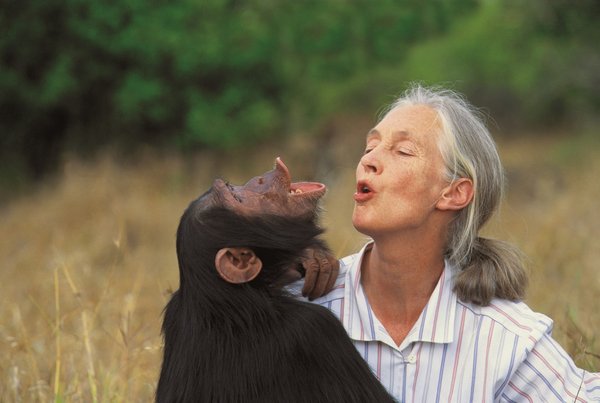Pioneer Conservationist Jane Goodall Awarded 2020 Tang Prize in Sustainable Development
TAIPEI,June 18,2020 -- Dr. Jane Goodall,DBE,founder of the Jane Goodall Institute,UN Messenger of Peace,and one of the most influential primatologists today,was announced winner of the 2020 Tang Prize in Sustainable Development today (June 18),"for her ground-breaking discovery in primatology that redefines human-animal relationship and for her lifelong unparalleled dedication to the conservation of Earth environment." Her work laid a strong foundation for the world's march towards a sustainable future.

Jane Goodall,one of the most important primatologists today,was named winner of the 2020 Tang Prize in Sustainable Development (Photo courtesy of Michael Neugebauer)
Redefining human-animal relationship
Dr. Goodall's passion for animals prompted her to accept the proposal from the celebrated anthropologist Louis Leakey to collect data on chimpanzees in Tanzania. She started her research in 1960 when she was only 26. Her time in Africa's jungles led to a series of remarkable discoveries of their behaviors,including making and using tools for probing into termite tunnels,killing and eating monkeys,begging with outstretched hands,patting and embracing,and many more. Each chimp has its unique character,a mind of its own and its own emotional inclination. They can develop a lasting relationship between family members and engage in brutal warfare with one another. These findings injected brand new information into the field of primatology,rocked the scientific world and redefined the relationship between humans and animals. Dr. Leakey therefore proclaimed: "Now we must redefine 'tool,' redefine 'man,' or accept chimpanzees as humans." And Harvard's Stephen Jay Gould would call Dr. Goodall's observation "one of the great achievements of twentieth-century scholarship."
Not only did she uncover many mysteries surrounding chimpanzee communities and correct many longstanding misconceptions prevailing in academic until then. Through her unparalleled knowledge,she also helped to guide the U.S. National Institutes of Health through a pivotal change in the U.S. biomedical research: ending invasive research on chimpanzees,preventing them from being abused,giving them adequate living space,and strategically relocating them to federal sanctuaries for retirement.
From science to action,advocating nature and wildlife conservation
Her fieldwork on chimpanzees,originally scheduled to take only 5 years,has been going on for more than 60 years,the longest running wildlife study on the planet at the moment. In 1977,she established the Jane Goodall Institute to promote wildlife conservation and educate people on environmental protection. It has more than 30 offices around the world now,including one in Taiwan,which was set up in 1998.
After attending the first "Understanding Chimpanzees" conference in Chicago in 1986,Dr. Goodall became alert to the global scale of the destruction of chimpanzees' habitats and realized that no matter how shy and reserved she was innately,it was time to come forward. When in a conference venue,she can just be a scientist. Outside of it,she has to assume the persona of an activist for wildlife conservation and environmental education. From then on,she became more vocal about the rights chimpanzees should be given.
Now 86 years old and claiming that she doesn't believe in jet lag,Dr. Goodall still travels an average of 300 days a year to speak to audience around the world about the threats posed to chimpanzees and the environment and urge them to take necessary action. Even the COVID-19 pandemic cannot stop her from working. On the contrary,she became even busier with projects aiming to enhance sustainable development and safeguard our environment.
Devoted to education to give people hope
In 1991,Dr. Goodall established the Jane Goodall's Roots & Shoots Program,further committing herself to environmental education and charity work. So far,more than 65 countries have taken up this worthy cause,helping form more than 10,000 Roots & Shoots groups around the world to teach young people how to think outside the box,and to adopt a more sustainable way of life. The goal is to foster a new generation of eco-conscious citizens to take care of our earth.
The Jane Goodall Institute launched the "TACARE Program" in 1994 for the region around the Gombe National Park. This community-centered conservation and development project,through close collaboration with local inhabitants,aims to protect the forests and halt biodiversity loss by alleviating poverty with strategies such as introducing sustainable farming methods,maintaining tree nurseries,starting a micro-credit program,and providing health facilities as well as scholarships for girls.
Over the years,Dr. Goodall has attracted a growing number of young followers,to whom she in turn gave most of her time by delivering talks all over the world to call for more emphasis on environmental protection. She once said: "My job is to give people hope." People may wonder whether she really has hope for the future,but she noted that,"I maintain hope partly because everywhere you go,there are young people who are dedicated,passionate and begging to make a change. You can't help but be inspired by them."
The invaluable contributions Dr. Goodall made in areas such as chimpanzee research and environmental education have seen her recognized by numerous prestigious awards and honors,including her appointment as the United Nations' Messenger of Peace in 2002 and Dame of the British Empire in 2004,which was presented to her by HRH Prince Charles. Therefore,the Tang Prize Selection Committee decided to name her the 2020 Tang Prize Laureate in Sustainable Development,in order to commend the crucial role she has been performing throughout her life,in promoting sustainable development in the international arena.
Established by Taiwanese entrepreneur Dr. Samuel Yin,the biannual Tang Prize consists of four categories,namely Sustainable Development,Biopharmaceutical Science,Sinology and Rule of Law,with each category receiving NT$ 40 million (US$ 1.33 million) in cash prize and a research grant of NT$ 10 million (US$ 0.33 million). It aims to promote the interaction and cooperation between culture and technology research so as to find a 21st century path to sustainable development. For more information,please visit the prize's official website at https://www.tang-prize.org/en/first.php
Photo - https://photos.prnasia.com/prnh/20200618/2834882-1?lang=0